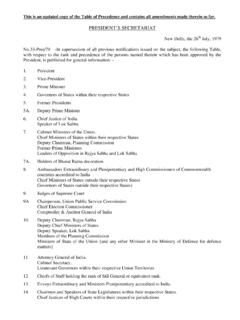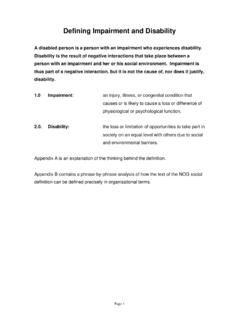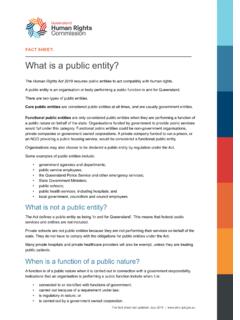Transcription of Local Government, Local Governance and Sustainable ...
1 Local Government, Local Governance and Sustainable DevelopmentGetting the Parameters RightDoreen AtkinsonHSRC Publishers Free download from Integrated Rural and Regional Development Research Programme, Occasional Paper 4 Series Editor: Mike de Klerk (Executive Director: Integrated Rural and Regional Development,Human Sciences Research Council)Published by the Human Sciences Research Council PublishersPrivate Bag X9182, Cape Town, 8000, South Africa Human Sciences Research CouncilFirst published 2002 All rights reserved. No part of this book may be reprinted or reproduced or utilised in any form or by any electronic, mechanical, or other means, including photocopying and recording, or inany information storage or retrieval system, without permission in writing from the 1684-5250 Produced by comPressPrinted by Lithotech AfricmailDistributed in South Africa by Blue Weaver Marketing and Distribution, Box 30370, Tokai,Cape Town, South Africa, 7966.
2 Tel/Fax: (021) 701-7302, email: Free download from PrefaceThe Human Sciences Research Council publishes a number ofOccasional Papers series. These are designed to be quick,convenient vehicles for making timely contributions todebates, disseminating interim research findings and otherwiseengaging with the broader research community. Publicationsin the various series are, in general, work-in-progress whichmay develop into journal articles, chapters in books or otherfinal products. Authors invite comments and suggestions fromreaders. Free download from About the AuthorDoreen Atkinson is a Research Director with the HumanSciences Research Council. She is based in the Bloemfonteinoffice of the HSRC. She has research and consultingexperience in the following fields: Local Government Rural Development Intergovernmental Relations Constitutional Development Water and Sanitation Local Economic Development Monitoring and Evaluation Health DeliveryHer publications during the last five years, include From a Tierto a Sphere: Local Government in the New South African Consti-tutional Order(co-edited with Maxine Reitzes, published byEISA and Heinemann Press, 2000);Rural Development Frame-work,for the Free State Provincial Government; and A Pathway to Sustainability: Local Agenda 21 in South Africa(co-edited with Penny Urquhart, for the Department ofEnvironmental Affairs, 2001).
3 She is currently working onmunicipal capacity-building, especially in the light of theimplementation of IDPs; as well as the development ofmunicipal capacity in commercial agricultural and suggestions on this paper can be emailed Free download from Local Government, Local Governance and Sustainable DevelopmentGetting the Parameters RightIntroductionSince 1994, South Africa has experienced a steep learningcurve with regard to institutional design in general, and localgovernment in particular. When the transition to democracytook place, South Africa inherited a dysfunctional Local govern-ment system, based on inappropriate jurisdictions, structuresand programmes. During the past eight years, great progress hasbeen made in designing municipal systems and governmentalprinciples intended to promote Sustainable chapter will highlight some of the achievements, whichhave provided the building-blocks for a development-orientedsystem of government and Governance .
4 However, achieve-ments often bring unintended consequences in their wake,giving rise to new problems and challenges. This chapter willalso reflect on the short and long term interventions that willneed to be made so that the governmental system can deliverthe desired outputs and is a means, not an end. Ultimately, it is a tool,an instrument to achieve a desired (developmental) this stage in South Africa s development experience it is1 Free download from necessary to ask: Have we designed the right kind of instru-ment? Are we ending up with a hammer or a spanner when weshould actually have designed a welder or a pair of bellows? Insum, will our system of government promote development-oriented Governance ? And what can we do to nudge it increas-ingly into that direction?In this chapter, consideration is given to the way in whichlocal government is placed within the total system of govern-ment.
5 Consequently, municipalities external relationships areas important as their internal functioning. It is only within sucha holistic view that the future development path of munici-palities and Local areas can be understood and promoted. Government and Governance Government is an institution. An institution, in turn, is a setof internal roles and relationships, rights and obligations,responsibilities and functions. An institution consists of peopleassigned specific positions, functions and roles within anorganised structure. A development-oriented Government, therefore, is one that has designed its internal relationships insuch a way that specific developmental goals are achieved. Governance , in contrast, refers more broadly to the environ-ment in which government functions, and to government srelationships with outside stakeholders. A system of governancerefers to government s relationships with the electorate, thepublic, the consumers of services, and non-state actors.
6 Adevelopment-oriented system of Governance , therefore, is aninstitutional environment in which government creates thetypes of relationships with outside stakeholders that encouragethose stakeholders to launch and sustain the past eight years enormous progress has been madein designing development-oriented government structures andgovernance systems in South Africa. The most significant inno-vation has been the formal adoption of developmental localDoreen Atkinson2 Free download from government as the cornerstone of development policies andprogrammes. In terms of the White Paper on Local Government(1998), the Municipal Structures Act1and the MunicipalSystems Act,2 municipal government has come to the fore asarguably the most important level of government in the over-riding purpose of promoting importance of Local government is based on several keyfactors.
7 Firstly, Local government is intrinsically is the only sphere of government that has the mandate tobring together a variety of sectoral issues within one develop-mental policy, programme or project. Secondly, localgovernment is closest to the people . This oft-used phrase hasseveral aspects. For one thing, municipal offices are oftensimply geographically closer to residents than other levels ofgovernment and, especially for poor people, such offices areoften easier to reach. For another thing, Local councillors havea much smaller constituency to report to than public represen-tatives at provincial or national level, and can thereforeconcentrate on issues and Local matters that are highly com-munity-specific. More specifically, the ward system ofrepresentation unlike the proportional representation systemat provincial and national level means that councillors mustattend to the needs and interests of specific councils are elected institutions, it means that acouncillor who consistently fails to deliver can be removed atthe end of his or her term of office or even during third important dimension of Local government is thespatial one.
8 Increasingly, development theorists and plannershave come to realise that development is profoundly labour-intensive. Real development requires ongoing involvement withbeneficiaries and communities, whether in the form of leader-ship development, institutional capacity-building, public parti-cipation in planning or project implementation and frequently,conflict management. It simply makes more sense for suchdevelopmental activities to be based at a level of governmentthat is staffed by people who are physically accessible to resi-dents, and who preferably live within the Local Government, Local Governance and Sustainable Development3 Free download from Clearly, then, Local government must play a key role withinthe developmental renaissance that Africa and South Africa have embarked upon. In this regard, South Africa is at thecutting-edge of development debates.
9 The claim that municipa-lities are the primary developmental agency within thegovernmental system has radical and far-reaching implicationsfor governmental structuring and practices. The real challenge,now, is to work through the implications of these claims anddebates. What would developmental municipalities look like?How would they function? What would their relationship bewith other institutions within the system of government? Andwhat should their relationships of Governance be with otherdevelopmental players?Municipalities are currently at a critical juncture in theirdevelopment. Since mid-2001, municipalities have beenrequired to write integrated development plans (IDPs). TheseIDPs are intended to be multi-sectoral programmes, includinga wide variety of development, ranging from hard servicessuch as water, sanitation, electricity, housing and roads, to soft or human development issues such as land reform, poverty-alleviation, tourism and Local economic development (LED).
10 Many municipalities completed their IDPs during early2002. The crucial question now is: Will they have the capacityto implement their IDPs? Or will IDPs become dust-coveredtomes that grace municipalities bookshelves? This paper willconsider some of the developmental questions that arise fromthe need to implement IDPs. The argument will proceed fromquestions of internal municipal management, to inter-municipal relations and, finally, to inter-governmental rela-tions. This paper will argue that the creation of developmentallocal government will require the contribution of every othercomponent of the governmental system. It has to be aninstitutional rebirth , based on a profound redesign of thegovernmental system as a whole. Municipal capacity-buildingcannot be dealt with in isolation, in piecemeal fashion. It hasto be part of a holistic re-orientation of government and Atkinson4 Free download from The impending challenge implementing IDPs Before 1995, municipalities focused primarily on the regularmaintenance of infrastructural services and social maintained streets, water pipes, storm waterdrainage, electricity networks, parks and cemeteries.





